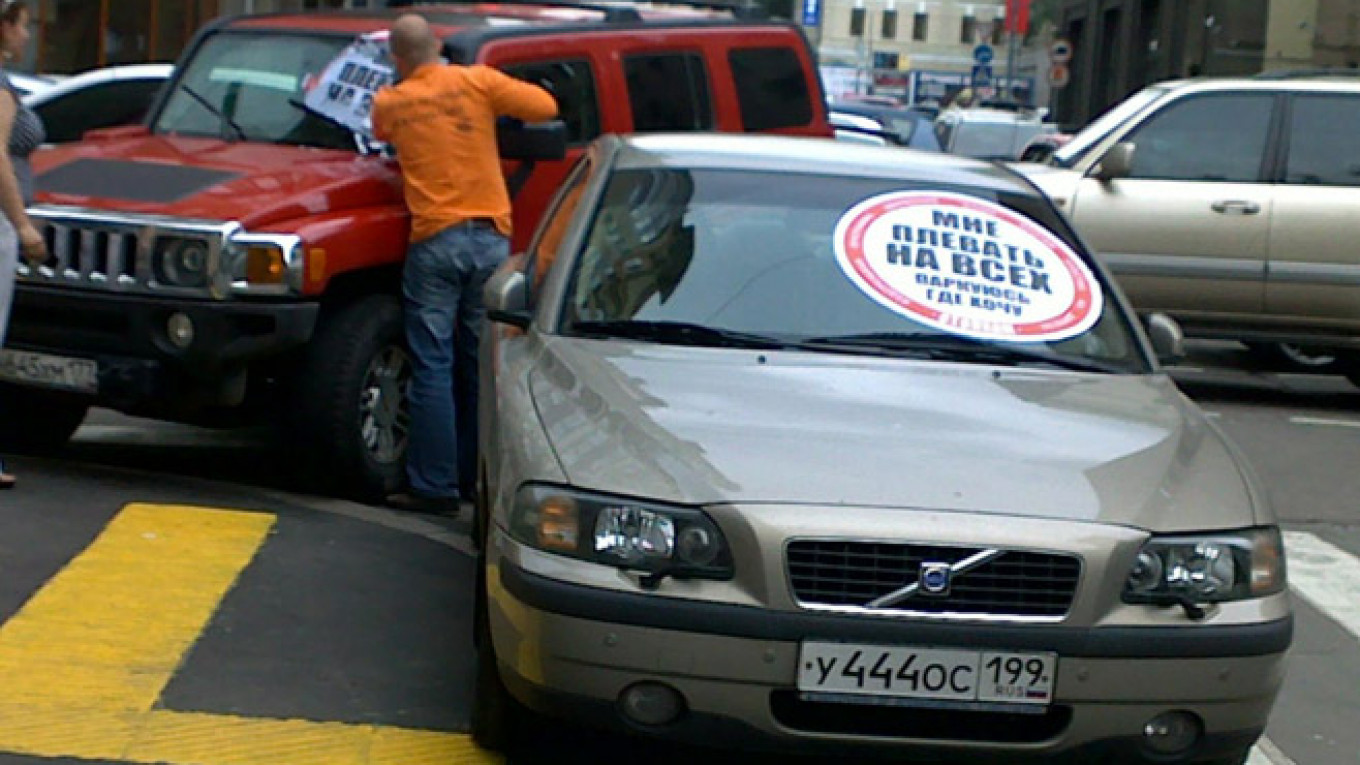This article was first published by Radio Free Europe / Radio Liberty.
It may not be the most appealing kind of activism. But it certainly makes for interesting, and often viral, YouTube footage.
During Friday rush-hour, Artyom Leonov, 20, and a group of activists, travel to a heaving, traffic-clogged highway in northern Moscow where they lie in wait for hours with video cameras. Their quarry: cars illegally driving on the hard shoulder.
When one comes, the activists physically block the car, and firmly call upon the driver to reverse back onto the highway as the cameras roll — an irritating humiliation for the motorist that every now and again elicits a spectacular hail of abuse and physical threats, all captured in high-definition color.
The action-packed footage — which over the years has depicted encounters with Kalashnikov assault rifles, baseball bats and pistols drawn in anger — is then spirited back to the group's production headquarters in downtown Moscow where it is slickly packaged to the tune of swaggering hip-hop and then published on YouTube and other social networks.
"We had a man with an axe once," says Leonov, a Chicago Bulls cap perched on his head. "There was a man who ran at us with a golf club. We've seen it all. There was even one time during a night raid when a man pulled out a grenade."
This is the magic formula behind Stopkham, a popular Kremlin-financed youth organization whose name translates roughly as "Stop the Boorishness."
The group is an offshoot of Nashi, the original and now defunct pro-Kremlin youth outfit founded in 2005 to keep the opposition at bay until it was phased out after a string of scandals.
//Millions of Followers
But unlike Nashi's harassment of the opposition, Stopkham takes aim at infractions on Russia's raucous roads — whether stopping motorists from driving on the sidewalk or chastising owners of badly parked cars by plastering windshields with the group's signature stickers: "I don't care about everyone else, I park wherever I want."
It has earned the group a millions-strong following on social networks.
Stopkham has received grants from the Kremlin of 4 million rubles in 2013 and 6 million rubles in 2014.
The group also appears to have tapped into anger in society over rampant traffic infractions. On the roads, drivers often toot their horns and shout out thanks to the activists. Others lean out of their car windows and ask for the Stopkham stickers.
The relative success of Stopkham signals how the Kremlin has got slicker with its youth groups and web activism in a world where the virtual is often more important than the reality.
The group also appears to be an attempt to co-opt the appeal of groups like the Blue Bucket brigade, which protests government bureaucrats' proclivity to flaunt traffic rules.
"Stopkham is an Internet show," said Pyotr Shkumatov, founder of the Blue Bucket brigade, adding that his group is "completely different."
Shkumatov notes that Stopkham's founder, Dmitry Chugunov, is a former Nashi "commissar" and is now a member of the Public Chamber, a Kremlin advisory body.
"His followers essentially engage in showmanship — fights, provocations, some other things. I think that this all appeals to a large number of people and gets a lot of clicks precisely because of Stopkham's tactic of provocation," Shkumatov said.
//Occupational Hazards
It's a tactic prone to backlash. On Feb. 10, four of the group's activists — one of them a 20-year-old woman — were savagely beaten in St. Petersburg. Three of them were hospitalized briefly and their cameras stolen during an attack reportedly led by a man the group had crossed in the course of their activism.
Stopkham was founded in 2010 under the aegis of Nashi. At the annual Nashi forum at Lake Seliger in the Tver region in 2010, the concept of Stopkham was immediately given the stamp of approval by Rashid Nurgaliyev, then Russia's Interior Minister.
Two years later, the group was re-registered as a separate organization because, in the words of one Stopkham activist, Anton Yerokhin, "Nashi had a bad reputation."
A spokeswoman for Chugunov, who only gave her first name, Alexandra, says Stopkham now has "nothing to do with Nashi."
The group has since opened regional units across the country.
The group is hypersensitive to protecting its reputation. As activists met near a Moscow metro station one Friday evening, many of them were smoking. But the cigarettes were quickly snuffed out when the cameras came out.
Before they begin patrolling the roads, Leonov firmly lays down the rules: no smoking, no drinking, no drugs, no swearing.
The group of some 20 activists aged between 18 and 29 then split into two groups.
In the space of an hour, a couple of cars drive down the hard shoulder to bypass a traffic jam. But upon seeing the activists, the drivers invariably reverse quickly. The activists say the poor haul is because this patch of highway is a favorite haunt and that drivers know what to expect.
Stopkham sometimes has the feel of a marginal and slightly geeky club. Many of its members hail from Russia's provinces. One is a computer game commentator, another a salesman for a mobile phone operator in a small town near Moscow, another is an out-of-work actor from Irkutsk who aspires to join Russia's elite "spetsnaz" Special Forces.
Despite Stopkham's efforts to distance itself from Nashi, which was infamous for its brazen harassment of opposition politicians and foreign ambassadors, there have been allegations that it is tied to Anti-Maidan, a similar pro-Kremlin youth group.
Bloggers in Moscow claimed to have spotted Stopkham activists among Anti-Maidan's ranks when the group crashed a Jan. 15 opposition rally in support of anti-corruption blogger Alexei Navalny.
Alexandra, the spokesperson for Chugunov, said she had "no information" that Stopkham activists attended this rally. She promised to clarify Stopkham's relationship to Anti-Maidan. But she had not done so by publication time.
A Message from The Moscow Times:
Dear readers,
We are facing unprecedented challenges. Russia's Prosecutor General's Office has designated The Moscow Times as an "undesirable" organization, criminalizing our work and putting our staff at risk of prosecution. This follows our earlier unjust labeling as a "foreign agent."
These actions are direct attempts to silence independent journalism in Russia. The authorities claim our work "discredits the decisions of the Russian leadership." We see things differently: we strive to provide accurate, unbiased reporting on Russia.
We, the journalists of The Moscow Times, refuse to be silenced. But to continue our work, we need your help.
Your support, no matter how small, makes a world of difference. If you can, please support us monthly starting from just $2. It's quick to set up, and every contribution makes a significant impact.
By supporting The Moscow Times, you're defending open, independent journalism in the face of repression. Thank you for standing with us.
Remind me later.






